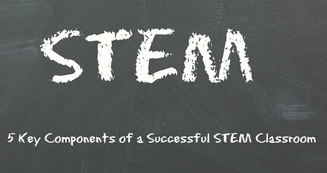 STEM classrooms are different – not only in coursework, but in educational outcomes. These classrooms rely less on memorization and more on critical thinking skills. When you visit a STEM classroom it just feels different – more alive, more energized, more like what you would expect. Five Key Components of a Successful STEM Classroom: Engaged Students – when students are engaged, they exhibit a higher level of critical thinking and content is not only memorized, but mastered. Timothy Huneycutt suggests in the National Math + Science Initiative Blog that creating a classroom where students are independently thinking in the classroom is the key to long term success. Project Based Learning – For many students, doing is the key to understanding AND retaining the information. Solid curriculum incorporates all learning styles (visual, auditory and kinesthetic) to address the learning styles of all students. Age Appropriate Curriculum – the building blocks of scientific inquiry are built in elementary classes, and build in middle school, though high school and post-secondary education. The right curriculum challenges students at every level, adding to previously mastered topics. Need an example? Pitsco Education has developed age appropriate curriculum for every age level. Career Focused – it’s never too early to start incorporating the real-world into the classroom. Real world applications will create connections for the student; they will never again need to ask “when will I ever use this in the REAL WORLD?” because every lesson will reinforce that (and make the lesson more tangible to the student). Flexible – high performance STEM classrooms all have classrooms that are designed for discovery and facilitate the lessons. Furniture becomes part of the teaching tool kit. Desks are mobile, table tops double as white boards for doodling and notes. Interior Concepts provides photos of the most popular room designs in this slide deck. What works well in your classroom? What tools and ideas are you excited to incorporate?
0 Comments
Leave a Reply. |
AuthorYou have questions about STEM education? You're not alone! We're here to share ideas and provide thought-provoking commentary. Let us know your thoughts! Sign Up for Email Updates For Email Marketing you can trust. Categories
All
Archives
February 2017
|
- Home
-
K-12
- College
- Industry
- Certifications
-
Partners
- Afinia-3D Printing
- Amatrol-Manufacturing Training Equipment
- Apolo Studios- Welding Simulation
- Bantam Tools - CNC
- CEF-Custom Educational Furniture
- DAC Worldwide-Manufacturing Training Equipment
- Greene Manufacturing Inc - Furniture
- Iconic CNC
- Interior Concepts-Furniture
- MSSC Certifications
- MINDS-i Education
- Pitsco Education-STEM
- SimLog-Heavy Equipment Simulation
- Stokes Robotics
- Techno CNC Systems
- Universal Laser Systems
- VictoryXR - Virtual Reality
- WB Mfg - Furniture
- Funding
- Contact
- About
- Home
-
K-12
- College
- Industry
- Certifications
-
Partners
- Afinia-3D Printing
- Amatrol-Manufacturing Training Equipment
- Apolo Studios- Welding Simulation
- Bantam Tools - CNC
- CEF-Custom Educational Furniture
- DAC Worldwide-Manufacturing Training Equipment
- Greene Manufacturing Inc - Furniture
- Iconic CNC
- Interior Concepts-Furniture
- MSSC Certifications
- MINDS-i Education
- Pitsco Education-STEM
- SimLog-Heavy Equipment Simulation
- Stokes Robotics
- Techno CNC Systems
- Universal Laser Systems
- VictoryXR - Virtual Reality
- WB Mfg - Furniture
- Funding
- Contact
- About

 RSS Feed
RSS Feed
